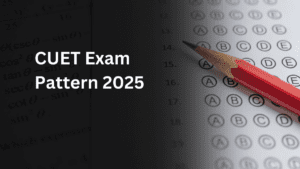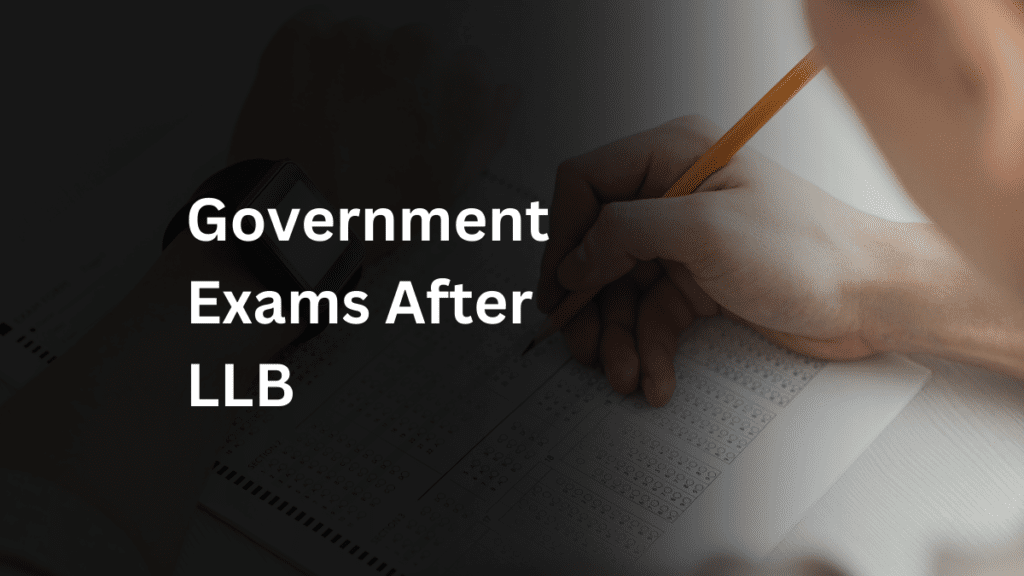Government Exams After LLB – A Bachelor of Laws or LLB degree provides lots of opportunities for careers in legal sectors in India. While many LLB graduates aim to practice law in courts, several others law graduates aspire to crack government jobs after LLB. Government exams after LLB for law graduates offer stable and better career opportunities, with roles ranging from judicial officers to legal advisors in PSUs, banks and government offices in India.
In this below article, we will cover various government exams after LLB that you can consider to build a fulfilling career. From Judicial Services exams to opportunities in top PSUs, you’ll gain a detailed understanding of the options available and how to prepare for them.
Why Choose Government Exams After LLB?
Government exams always preferred by graduates because of the stability and benefit it provides – from stable career option, financial stability to respect in society. Below are benefits of government jobs after LLB for law graduates, such as:
- Job Security: A stable career with assured income and many benefits.
- Many Opportunities for Growth: Multiple promotion avenues and professional development.
- Better Work-Life Balance: Structured work hours compared to private legal practices.
List of Best Government Exams After LLB
There are many government exams after LLB for law students in sectors ranging from PSUs, banking, government departments to railways. Law graduates who wants to appear for government exams can check the exams list below –
- Judicial Services Examination – PCS(J)
- IBPS Law Officer Exam
- Public Prosecutor Exam
- PSU Legal Officer Recruitment
- UPSC Civil Services Examination (JAG)
Government Exams After LLB for LAW Graduates
1. Government Exams After LLB – PCS(J)
The Provincial Civil Service Judicial exam, known as PCS-J is one of the most prestigious entry level exams for law graduates who wish to become a civil judge in the state courts. This exam is most sought government exam after LLB for law graduates. Clearing this exam will gives candidates entry to the subordinate judiciary roles. PCS(J) exams are conducted by the state government under state high court supervision.
PCS(J) Eligibility Criteria:
- Bachelor of Laws (LLB) degree from a recognized university
- Enrollment as an advocate under the Advocates Act, 1961
- Age: Between 21 to 35 years (varies by state)
- There are two entry level in Judiciary exam – Lower Judiciary Services and Higher Judiciary Services. Higher Judiciary Services additional requirement is that a candidate should have 7 years of experience as lawyer.
Exam Pattern
- Preliminary Exam: MCQs or Objective-type questions.
- Mains Exam: Descriptive-type questions focusing on procedural and substantive laws.
- Interview: Assessment of personality and legal aptitude.
Career Options
- Civil Judge (Junior Division)
- Promotion to District Judge and higher judicial roles.
2. Government Exams After LLB – Law Officer in Public Sector Banks
IBPS conduct exams for various officers posts in the banking sector for public sector banks including SBI, Associate Banks of SBI, NABARD, RBI, SIDBI, LIC and Insurance companies and other member banks of IBPS. IBPS conducts multiple exams for different posts and positions like –
- IBPS SO Exam
- IBPS Law Officer Exam
- IBPS PO Exam
- SBI Law Officer Recruitment
- RBI Legal Officer (Grade B)
- RRB Officers Exam and,
- Office Assistant in RRB.
IBPS exams registration starts every year in November while their prelims and mains exam gets conducted in December – January duration.
Eligibility for Law Officers in Banking
- Age Limit: 20-30 Years
- Candidate must have an LLB degree
- Candidate must have degree from recognized university.
- Candidate must enrolled with Bar council as an advocate.
Recruitment Process
- Prelims exam (Reasoning, English, General Awareness).
- Mains exam focusing on professional knowledge of law.
Also Check – SBI Clerk 2025 Notification
3. Government Exams After LLB – Public Prosecutor Exam
Public Prosecutors represent the state in criminal cases in different high courts and lower courts. This role involves legal research, drafting, and court representation. LLB graduates aiming to serve as a public prosecutor need to clear specific examinations conducted by the UPSC or State PSC
Eligibility Criteria –
- LLB degree.
- Minimum two years of practice as an advocate.
Recruitment Process –
- Written Test: Focuses on criminal law, evidence law, and procedural law.
- Interview: Evaluates legal knowledge and argumentation skills.
Career Options –
- Assistant Public Prosecutor
4. Government Exams After LLB – Legal Officers in PSUs
Many Public Sector Undertakings (PSUs) such as ONGC, SAIL, NTPC, and GAIL recruit law graduates for the position of Legal Officer. These roles offer job security and opportunities for growth in large government organizations.
PSUs Legal Officer Eligibility Criteria
- LLB degree.
- Qualifying in exams like CLAT-PG.
Recruitment Process
- CLAT-PG Score: Basis for shortlisting.
- Group Discussion and Interview: Evaluate communication and analytical abilities.
Career Prospects
- Legal Officer
- Senior Legal Counsel
5. Government Exams After LLB – UPSC JAG
The Union Public Service Commission (UPSC) conducts exams for the recruitment of Assistant Commandants (Law) in organizations like BSF and CRPF.
Eligibility
- LLB degree.
- Physical fitness as per requirements.
Recruitment Process
- Written Test: Covers law, reasoning, and general awareness.
- Physical Tests and Interview: Assess physical and leadership skills.
Career Prospects
- Assistant Commandant
- Leadership roles in paramilitary services.
Career Opportunities After Government Exams for Law Graduates
There are a variety of prestigious roles available for law graduates after clearing Government exams:
- Judicial Officer (Judge): You’ll start as a Civil Judge and can eventually be promoted to District Judge and higher.
- Public Prosecutor: Handle high-profile criminal cases on behalf of the state.
- Legal Officer in PSUs: Work on contracts, labor disputes, and compliance within a public sector framework.
- Assistant Public Prosecutor: Handle prosecution work under the guidance of senior prosecutors.
- Indian Legal Services: Drafting legislation, advising the government on legal matters, and representing the country in international forums.
How to Prepare for Government Exams After LLB
- Understand the Syllabus: Each exam has a well-defined syllabus that covers legal concepts, current affairs, and procedural law. Study it thoroughly.
- Mock Tests and Previous Year Papers: Practice is key. Use mock tests and solve previous years’ question papers to gain familiarity with the exam pattern.
- Time Management: The key to cracking government exams is efficient time management. Ensure you allocate time wisely between the core subjects and the optional ones.
- Regular Revision: Legal concepts, especially procedural and constitutional law, need constant revision. Prepare notes to help with this.
- Stay Updated: Law is a dynamic field, and staying updated with the latest judgments and legal developments is crucial.
Related Articles –
Conclusion
Government jobs after LLB offer immense growth opportunities, job security, and the ability to make a significant impact on society. Whether you aspire to be a judge, a public prosecutor, or a legal officer in a PSU, these roles require dedication and rigorous preparation. By choosing the right path and preparing effectively, you will be able to crack these government exams after law.
Frequently Asked Questions (FAQs)
What are the top government exams after LLB?
The top exams include Judicial Services Examination, Public Prosecutor Examination, Law officer in banks, and PSU legal officer recruitment through CLAT PG.
Can LLB graduates apply for UPSC exams?
Yes, LLB graduates can apply for the UPSC Civil Services Examination and opt for law as their optional subject.
How can I become a judge after LLB?
To become a judge, you need to clear the Judicial Services Examination conducted by the respective state government. This exam involves both written and interview stages.
What is the role of a Public Prosecutor?
A Public Prosecutor represents the state in criminal cases, ensuring that justice is served. They present evidence, question witnesses, and argue cases in court.
What is the syllabus for PSU Legal Officer exams?
The syllabus typically includes Company Law, Contract Law, Labour Laws, and Arbitration. Candidates must qualify through the CLAT PG exam







